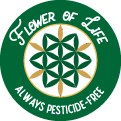
More and more states are legalizing cannabis yet it still remains illegal at the Federal level. This delay in legalization has resulted in a lack of guidance, research and regulation on the effects of pesticide use on cannabis. I’ve also noticed the term “organic” is used very loosely in the cannabis industry. This can create a lot of misinformation to unaware dispensaries and patients. My hope is to bring to light the harm conventionally grown cannabis can have on the body and what information dispensaries and patients should ask their growers before purchasing cannabis.
What Does It Mean To Be Organic?
“Organic” is traditionally a term used by the USDA [United States Department of Agriculture] to certify the grow process of federally legal agricultural products. There are certain pesticides which have been approved for organic use on produce, here’s a list of those, however it’s important to note that each pesticide is approved for a specific use and must follow specific criteria. A chemical may be approved for use on some foods while restricted for use on others. Even so, 95 percent of the product must be grown completely naturally, without any additional additives, including those from the list of approved chemicals.
The EPA [Environmental Protection Agency] sets tolerances, regulating pesticide sales and uses for farmers; just not for the cannabis industry. This has left many cannabis growers without expert guidance on how to apply these substances. Not to mention, the research of these substances for cannabis application is greatly lacking. Because cannabis is federally illegal, the USDA and EPA aren’t regulating pesticide use on cannabis crops. The same “organic” pesticides used on produce hasn’t been tested or approved for use on cannabis. Given that cannabis is ingested in many forms – vapor, smoke and inhalation, orally digested – the pesticides should be tested for a specific crop and its specific end use.
How Do We Define “Organic” Cannabis?
“Organic” is a subjective term as it pertains to cannabis. Many consider organic to be anything grown without additional synthetic inputs such as; pesticides, insecticides, fungicides and fertilizers.Organic has to be the most misleading term used in the cannabis industry. Because there is no industry standard and very few regulations around how cannabis is grown, it leaves growers to their own accord. Often, many growers will choose the route which is easiest. In many cases, this is to grow cannabis plants using synthetic inputs.With education and a little forethought however, growing cannabis organically can actually be more cost-effective in the long run.
Pesticides Transferred Through Inhalation
According to this study by a cannabis testing company, Determination of Pesticide Residues in Cannabis Smoke, “chemical residues present on cannabis will directly transfer into the mainstream smoke and ultimately the end user.” The study was conducted using three methods of cannabis inhalation: a hand held glass pipe, an unfiltered water pipe, and a filtered water pipe. They concluded, “The effects of filtration have a significant impact on the total residues consumed,” however overall pesticide recovery was “alarmingly high”. In other words, a filtered smoking device can potentially limit the amount of pesticides ingested but overall pesticides are a health concern for cannabis consumers.
Concentrates Are Most Contaminated
THC concentrates used in vaporizers are an increasingly popular method of medicating but consumers should use caution. A study from the Cannabis Safety Institute, Pesticide Use On Cannabis, found that cannabis concentrates contain the highest levels of pesticides. “Inhaled chemicals are typically present at much higher levels in the body than those that are orally ingested. Research has shown that pesticides on Cannabis can be transferred into Cannabis smoke with efficiencies as high as 70%.”Per the same study, “pesticides can now be found on close to half of the Cannabis sold in Oregon dispensaries.” Meaning there’s a 1 in 2 chance you’ll wind up purchasing contaminated cannabis there.
How To Find Truly Organic Cannabis
This blog post barely begins to scratch the surface of the issue of pesticide-use on cannabis. I am hopeful more growers will turn to natural farming practices and more states will regulate the use of fungicides and pesticide on cannabis. Until then, you can start by asking your cannabis grower one simple question: What synthetic inputs do you use on your cannabis plants? If your grower responds with an answer other than “none” then they aren’t truly growing organically. Unfortunately, there is no industry standard for the term organic in cannabis farming but that doesn’t mean you can’t be a savvy patient or dispensary. Get to know your growers, form relationships with them, ask them questions and hold them to a higher standard.
Another article that you may be interested in:
Is there rat poison on your cannabis?
The Dirty Secret of California’s Cannabis: It’s Dirty,
